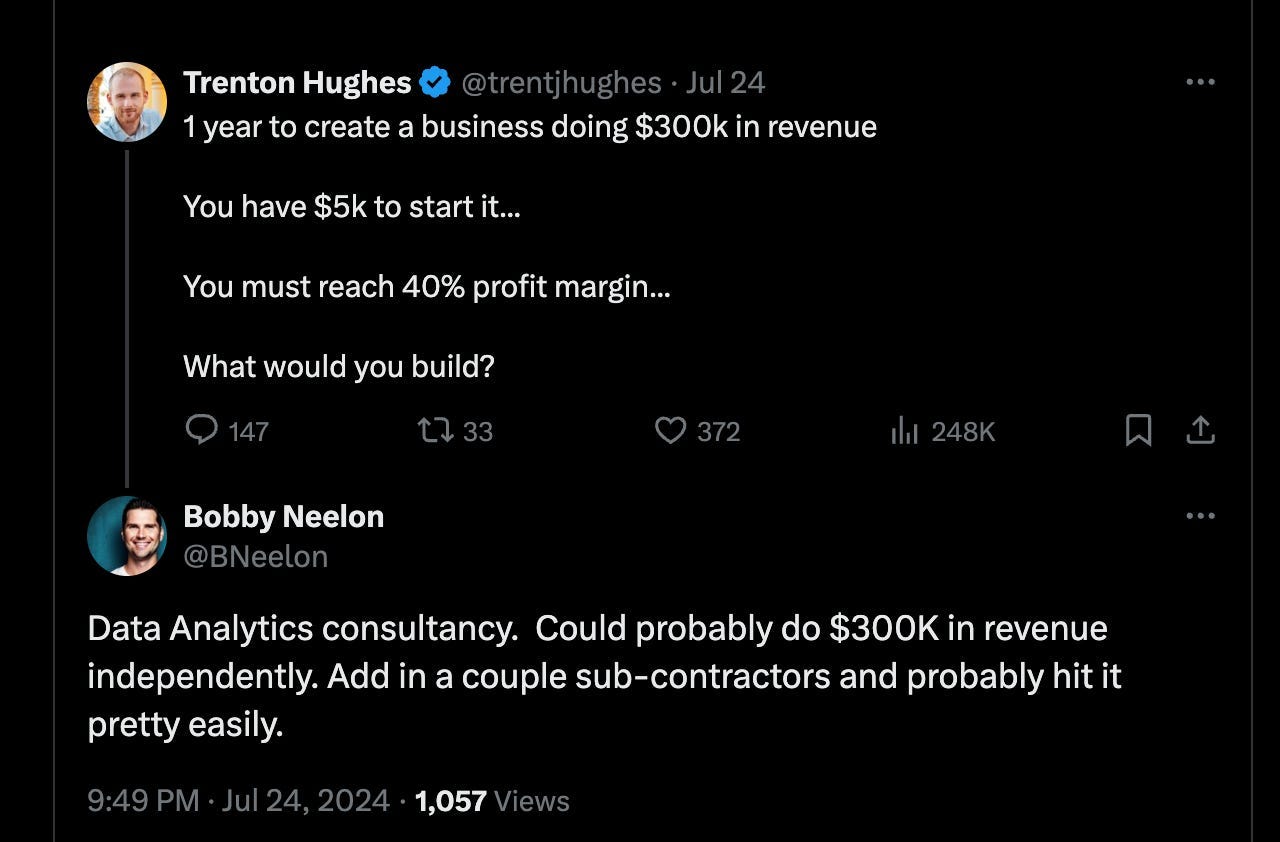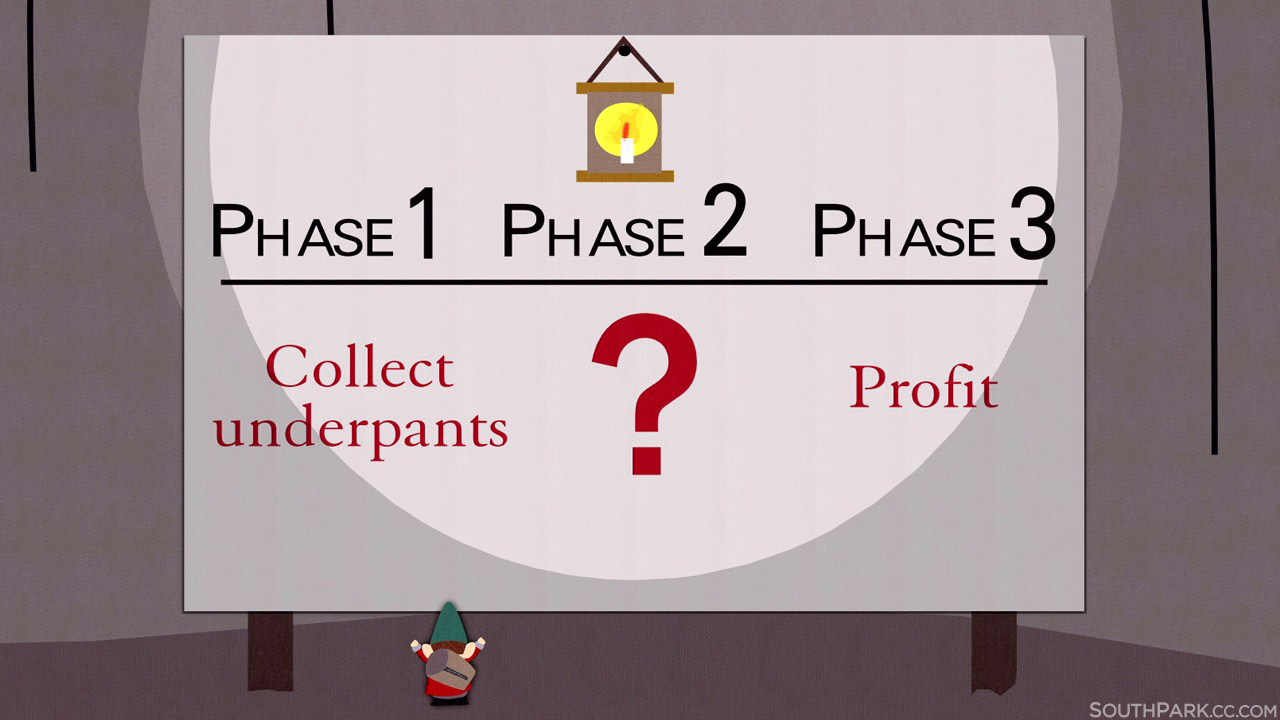Why Chasing Money Can Hurt Your Earnings (And What to Do Instead)
The harder you chase money, the less you will earn.
I have found this to be a true mantra to a point.
At the end of the day, we are paid to solve problems. But what each problem is worth can be drastically different, and more importantly, the economics around how you solve it impact your earnings.
So how do you balance said trying to hit your own financial goals and not chasing money?
Here is how I have approached it.
Let’s say you want to make $300k a year consulting.
It’s a good amount of money, and recently it was brought up in a Twitter thread which someone from the TFA Community shared with me.
In this article, let’s discuss how you can start to find problems that could lead to a at a $300k/year income.
The Breakdown
Now you shouldn’t focus on the dollars, but I do like the mental exercise it forces you to do when you think about the amount of money you’re asking for.
Let’s say your goal is $300,000 USD a year. Truthfully that number is arbitrary.
That breaks down to $25k a month. Now there are plenty of people out there who will say it’s so easy to find two clients that will all pay you $12.5k each.
That’s not true. That’s a lot of money.
But, it’s a great chance for you to ask the question.
If you are trying to have two customers a month, what is worth $12.5k to them (and we’ll talk about how you figure that out later)?
Or maybe you just want one client.
What is worth $25k a month?
And so on.
You shouldn’t chase money, but you should understand what people value. And let’s start by asking said people.
How Do You Know What to Focus On?
It’s easy for hustle bros and financial TikTok channels to say “Just make X amount of money per month.” But you can’t just get rich in an Excel sheet.
Write up some formulas, and never actually answer the second part of the money equation. You know the old meme..
The first of this set of instructions should be to figure out what problems people have (and are willing to pay to have solved).
The second is to solve them.
But how do you actually find problems people are willing to pay for?
If you’re feeling stuck in terms of understanding what your customers value, the quick way to get unstuck is…
…to talk to possible customers(of course you need to define your target persona first).
I’ve said this a few times but that’s where you start. You likely have connections either to people who fit your ideal customer person or perhaps know people who know people.
Don’t feel like you’re stuck and don’t try to guess what people want.
First off, it’s not a bad idea to just talk to 20-30 possible customers and give them some free consultations as it is a way you can network.
It also helps you understand what their actual problems and stresses are. As engineers and technical folks, we might think of very tangible end products; a data pipeline, a website, and an application.
But what problems are we actually solving?
Not in terms of technical problems but in terms of business problems.
What Is of Value - Beyond Just Code
Jonathan Stark once said that:
Coding is one of the least valuable things an experienced developer can offer to a client…they are paying for the business outcome that they believe the code will achieve.
There is some nuance to that statement. One of the points I take from it is that the value we are receiving isn’t just coding.
Instead, there are lots of other high-value problems you can solve like:
Helping select a data solution or vendor that ensures the company doesn’t need to migrate in a year and spend possibly +$100,000 to do so
Designing a system that will scale and is robust even when the company replaces you with a more junior engineer
Reviewing infrastructure, assessing possible risks and performance issues, and providing an analysis
Helping hire and up-skilling the data or software teams
Helping plan and reduce risk for a migration
Etc.
Or here is a real-life example. When I first started consulting, I offered companies a service where I set up their end-to-end infrastructure (or fixed their current broken data stack) in 90 days. I did this for multiple clients.
In all cases, there are several aspects of value that I provided:
Speed - Oftentimes, I found that if a company hired an engineer they’d take 3-4x the length to deliver the same work and likely they might not even complete the project. So they’d spend over $120,000 to get things done slower.
Experience and confidence - Since I had done so many end-to-end project deployments, I knew a lot of the gotchas of various solutions as well as costs. Meaning I could help ensure the company found the solutions that met their functional and budget needs.
Business alignment - Most companies want to focus on every metric under the sun. If you can help outline which metrics are important and how they connect to the company's overall strategy, you are providing far more value than just coding.
Set standards - My goal was never to stick around on any project. Instead, I would build the foundation for future engineers so they don’t have to have a principal engineer on staff for the future. They could use what I set up and build on top of that.
Overall, the value you can add is so much more than the implementation work. There are so many steps that need to happen before to ensure the project is a success and step one is understanding the business problem you’re trying to solve with said implementation.
You Do A Lot More Than Code
Finding your 20, 40, 60, or 100k problem isn’t about just asking for $100k in a proposal; it’s about understanding what problems people want solved and solving them. Most of the time, even the clients don’t know exactly what problems they have. They have done their best to assess their problems but they aren’t technical.
If you can bridge the technical and business gap and help them better understand their problems, you’ll quickly start to find what businesses value and hopefully what your $25k a month project is. Just make sure it ties back to the business.
With that, I want to say thanks for reading!
Past Newsletters You Might Want To Read!
How I Landed More Than 1 Million Dollars In Revenue For Seattle Data Guy
5 Books Every Consultant Should Read
Day In The Life Of A Data Consultant
Join My Technical Consultants Community
If you’re a data consultant or considering becoming one then you should join the Technical Freelancer Community! I recently opened up a few sections to non-paying members so you can learn more about how to land clients, different types of projects you can run, and more!
Starting Your Own Consulting Company Today
Looking to start your own data analytics consulting company? Not sure how to attract clients, partner with the best vendors, or choose projects you're passionate about?
I've been there. In my Technical Freelancer Academy, I share how I built a successful data analytics consulting business from the ground up. A business that made it possible for me to quit my data engineering job at Facebook.
See you there!






